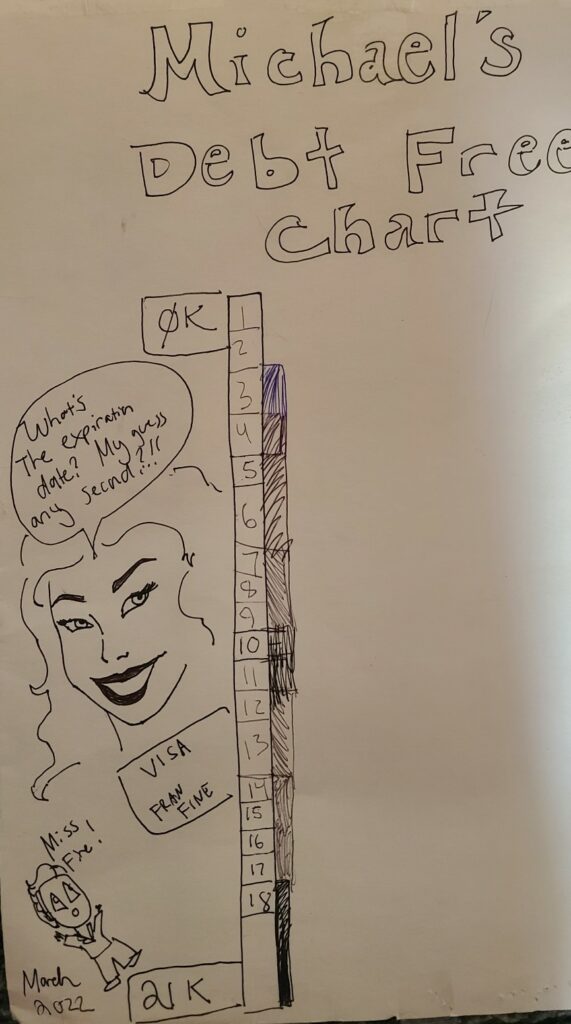Brian and Michael, both 34, live with their two cats in central Connecticut. Michael works as a project coordinator for a state behavioral health agency serving young people and has a side job as an advocate and disability leadership coordinator. Brian is a quality assurance manager for a state-run hospital. The couple’s been together since 2013 and looks forward to celebrating their 10-year anniversary in November. While Brian and Michael have achieved a lot, they feel as though their debt and lack of home ownership is holding them back. They’d like our advice on how to unlock this next level of adulting and, crucially, how to be permanently debt-free.
What’s a Reader Case Study?
Case Studies address financial and life dilemmas that readers of Frugalwoods send in requesting advice. Then, we (that’d be me and YOU, dear reader) read through their situation and provide advice, encouragement, insight and feedback in the comments section.
For an example, check out the last case study. Case Studies are updated by participants (at the end of the post) several months after the Case is featured. Visit this page for links to all updated Case Studies.
Need Help With Your Money? Book a Financial Consultation With Liz!
Money is terrifying for a lot of people and many of us don’t know where to start.
That’s where I come in.
I demystify personal finance and break it down into manageable steps.
I explain:
how to confidently manage your money on your own
I help people figure out how to make their money enable them to live the life they want.
Financial Tune-up
$1,500
For people who are financially savvy and want a second opinion on their money trajectory.
✶ Most Popular ✶
Complete Financial Consultation
$3,500
For folks who need a complete financial plan & analysis of their financial future. No prior money experience required!
Complex Financial Consultation
$5,500
For folks with complex financial situations, including more than one rental property and/or a small business.
Not sure which package is right for you?
Book a free 15-minute call with me to discuss.
The Goal Of Reader Case Studies
Reader Case Studies highlight a diverse range of financial situations, ages, ethnicities, locations, goals, careers, incomes, family compositions and more!
The Case Study series began in 2016 and, to date, there’ve been 103 Case Studies. I’ve featured folks with annual incomes ranging from $17k to $200k+ and net worths ranging from -$300k to $2.9M+.
I’ve featured single, married, partnered, divorced, child-filled and child-free households. I’ve featured gay, straight, queer, bisexual and polyamorous people. I’ve featured women, non-binary folks and men. I’ve featured transgender and cisgender people. I’ve had cat people and dog people. I’ve featured folks from the US, Australia, Canada, England, South Africa, Spain, Finland, the Netherlands, Germany and France. I’ve featured people with PhDs and people with high school diplomas. I’ve featured people in their early 20’s and people in their late 60’s. I’ve featured folks who live on farms and folks who live in New York City.
Reader Case Study Guidelines
I probably don’t need to say the following because you all are the kindest, most polite commenters on the internet, but please note that Frugalwoods is a judgement-free zone where we endeavor to help one another, not condemn.
There’s no room for rudeness here. The goal is to create a supportive environment where we all acknowledge we’re human, we’re flawed, but we choose to be here together, workshopping our money and our lives with positive, proactive suggestions and ideas.
And a disclaimer that I am not a trained financial professional and I encourage people not to make serious financial decisions based solely on what one person on the internet advises.
I encourage everyone to do their own research to determine the best course of action for their finances. I am not a financial advisor and I am not your financial advisor.
With that I’ll let Michael, today’s Case Study subject, take it from here!
Michael’s Story
Hi, Frugalwoods! I’m Michael, my partner is Brian and we’re both 34. We have two kittens and live in central Connecticut. I work as a project coordinator for a state behavioral health agency that serves young people, and my side job is as an advocate and disability leadership coordinator. I am passionate about my work since I’m a brain injury survivor and have had mental health challenges. Brian works as a quality assurance manager for a state-run hospital. We’ve been together since 2013 and will celebrate our 10-year anniversary this November.
Michael and Brian’s Hobbies
I love books (both reading and collecting) and enjoy cooking and reading about food, drawing, watching tv and movies, and the occasional video game. When he isn’t enjoying quiet time at home with us, Brian enjoys spending time outdoors running, hiking, gardening, attending community events and traveling. He is also a lifelong learner and advocate who enjoys watching documentaries, attending webinars, visiting museums and then sharing the information he learns with others.
Originally from the Boston area, Brian comes from a large Irish Catholic family and spends many weekends traveling to spend time with them. After struggling through his secondary and undergraduate studies, Brian is eager to achieve academic success in a potential future graduate degree program.
Some of our major goals include owning a home, getting married, starting a business, achieving athletic success and leaving a lasting legacy.
What feels most pressing right now? What brings you to submit a Case Study?
A lot happened this past year and we feel like we’re just now making it to the other side. We had two major life events:
- We lost Rex, our dear cat of nearly 8 years, to cancer.
- Our apartment building was sold to a new company that didn’t renew anyone’s lease.
We went from enjoying a cozy, 600 sq ft studio apartment (at $945/month) to navigating the 2022/2023 rental market. We spent 3.5 months scrambling to find a new place to live, packing up our lives and uprooting ourselves from what had been our happy home for the past eight years–all while caring for two new kittens with tummy trouble–it was a lot!
Back in August 2022, our life looked totally different–our plan at that time was to move into a house when we were ready, along with our cat Rex. We were forecasting an ability to re-enter the housing market in late 2023 prior to our unplanned veterinary and moving expenses.
Our Debt
Brian paid off all of his student loans a few years ago (a total of $58,000 ) and has been promoted in his job. He made career changes from corporate to private non-profit and most recently to the public sector (with the state). While he was initially resistant to applying, Brian now acknowledges that had it not been for my encouragement to apply for his current state job, he’d be earning significantly less, would not have such generous benefits (i.e. healthcare for life and a pension) and our standard of living would not be as comfortable.
While he currently has no student loan debt, Brian has significant consumer debt and minimal liquid savings. His long term investments are underfunded and not as diverse as he would like, which poses the risk of not having adequate retirement income when we are of retirement age. This is especially concerning to us given the precarious status of Social Security in the current political climate. Brain also views not owning real estate as a vulnerability in the current housing/rental market.
Brian wants to be able to take advantage of the opportunity to “buy low” and is concerned about not being in a financial position to do so when the housing market turns. Brian’s consumer spending is exorbitant; that coupled with his lack of savings makes him fear that he will not be able to achieve his life goals or provide for our family as we get older, given that he may not have time to make up for previous financial mistakes and irresponsible spending. Brian feels that professional help is needed to ensure our individual and shared goals are achievable and don’t become dreams forever deferred.
I have wonderful bosses and leadership at my current jobs, but am feeling called to pursue opportunities on my own as well. I want to devote time going forward to explore how I can use my interests and skills in meaningful and enriching ways, such as through organizing, cooking, coaching, etc.
What’s the best part of your current lifestyle/routine?
Our Hobbies
Now that the move is over, Brian has been enjoying running in his free time. Our new space allows us to have a home library/media room with surround sound, which is great for enjoying TV and movies together. The home office also provides us space to each do quiet work on the computer together.
Our Home
We live comfortably in a luxurious two-bedroom, two-bathroom apartment in a refurbished mill. While we’d prefer to live somewhere more rural, our apartment looks out over a quiet private parking lot to a forested river parcel, which provides additional privacy. The building has remarkable industrial architecture that we enjoy in our apartment, including oversized windows and ledges, 12 ft ceilings, exposed wood boards and support beams, various bolts, pulleys and other industrial devices from when this was a working mill. While we loved our former space, our new space gives us room to breathe and provides (almost) adequate space for our large collection of personal belongings (we prefer to call them treasures).
The new space also provides me with a real home office (I was previously relegated to a small corner desk in our studio apartment) as well as a dining room/bar, library/media room, galley kitchen and separate bedroom. Previously all of these (aside from the one bathroom) were in the same room. While not as cozy, this home feels more formal and age-appropriate. The building is quiet with respectful neighbors, there’s a donut shop across the street, I can see the hospital I work at from the parking lot and we’re right off the highway, so hitting the road for a day trip or to travel to see family is a synch.
What’s the worst part of your current lifestyle/routine?
Michael – feeling shame at my financial situation. I was briefly debt-free after years of being in debt, then spent a fair amount with the apartment move and so many things up in the air. Thankfully, it isn’t catastrophic but I wish I’d made different choices. Also, being at home so much is like endless chocolate cake – great at first, but can be isolating! I need to build in more walks outside.
Brian – feeling shame at my financial situation. I feel way behind my peers and family members – financially, professionally, academically, athletically, socially. I don’t like that I lack a clear plan on how to manage my money effectively. I know I’m not saving enough. I also feel like I lack the financial discipline to accomplish basic signifiers of adulthood. I feel as though I am a source of disappointment to my family. Also, I dislike not having our own land – I want to have a garden and some earth to call my own.
Where Brian and Michael Want to be in Ten Years:
- Finances:
- According to Michael:
- Debt free within 1 year for Brian, 6 months for me.
- A comfortable savings amount and increased retirement contribution.
- I am giving myself the goal to make $20-30k more within a year, and have taken some initial steps and sent out some applications.
- Money for travel, technology/hobby upgrades and our other interests.
- According to Brian:
- Debt free.
- 18 months of living expenses in liquid savings.
- Adequately vested in my retirement.
- With diverse assets.
- Working closely with a financial advisor and CPA.
- With an excellent credit score.
2. Lifestyle:
- According to Michael:
- In a home – doesn’t need to be huge, but nature is a must for us.
- We are thinking of staying in central CT but are open to southeast CT where I grew up, or the Rhode Island/CT border.
- Brian’s job is fully in person so that is the deciding factor unless he transfers to a different position; but, there are more opportunities in central CT.
- According to Brian:
- Owning our own homes (primary residence and second home) with in-law space for our parents to live with us part-time and indoor/outdoor space to entertain.
- Married.
- Belonging to a country club.
- Able to travel someplace once each year.
- Owning an electric car.
- Having help around the house for ourselves and our parents.
- Being involved in our communities.
3. Career:
- Brian sees himself growing in his current role and achieving an executive level position within the next five years. He would also like to take over his father’s business and continue being involved in civic affairs (i.e. running for public office, etc.).
- Within ten years, I would like to be able to provide part-time consulting services.
Brian and Michael’s Finances
Income
| Item | Number of paychecks per year | Gross Income Per Pay Period | Deductions Per Pay Period | Net Income Per Pay Period |
| Brian’s job | 26 | $3,929 | Taxes – $1,000.23 benefits & retirement (403b, 457, pension, med/dental/vision/life insurance)– $569.63 | $2,344.36 |
| Michael’s Main Job | 26 | $1,717 | health, vision and dental insurance: $50.84 401k contributions: $171.68 HSA: $134.61 Taxes: $293.97 TOTAL deductions: $651 |
$1,066 |
| Michael’s 2nd job | 26 | $798 | Taxes – $94.60 | $703.61 |
| Michael – public speaking / consulting *last calendar year* | Sporadic | $2,000 | ||
| Brian – help with family business seasonally (tax prep support) | Annual | $500 | ||
| Annual total: | $167,544.00 | Annual total: | $109,455.42 |
Mortgages: none
Debts
| Item | Outstanding loan balance | Interest Rate | Loan Period/Payoff Terms | Monthly required payment |
| Brian’s Visa (SCU) | $16,057 | 0% until November 2023 (17.99% after) | The goal is to reduce this as much as possible before November | $302 monthly minimum payment |
| Michael’s Visa Platinum | $9,700 | 10.99% interest | Michael will pay at least $1,400 per month for an estimated 6 month payoff (unless you recommend we reduce our savings in order to pay it off faster!) | $174.03 monthly minimum payment |
| Brian’s Visa Platinum (Navy Federal) | $2,503 | 0.99% until November 2023 (17.74% after) | Brian will snowball this first to pay it off | |
| Total: | $28,259 |
Assets
| Item | Amount | Notes | Interest/type of securities held/Stock ticker | Name of bank/brokerage | Expense Ratio (applies to investment accounts) |
| Michael’s 401k | $36,992 | My 401k through work. I contribute 10% and my company matches 4%. I am fully vested. Should I increase my contributions? | Vanguard Target Retirement 2055 | Vanguard | 0.08% |
| Brian’s 401k (old job) | $19,305 | ||||
| Brian’s Pension Fund | $8,953 | Assuming we calculated it correctly on the state retirement calculator… In 2054 after 35 years of service, it shows a monthly payout of $4,150. | |||
| Michael’s Savings Account | $7,000 | This is my emergency fund | Navy Federal Credit Union | ||
| Brian’s 457 | $5,886 | ||||
| Brian’s 403b | $3,389 | ||||
| Brian’s HSA | $3,093 | ||||
| Michael’s HSA | $2,100 | Health Savings Account | |||
| Brian’s IRA | $1,325 | ||||
| Brian’s savings | $1,000 | Sharon Credit Union (SCU) | |||
| Brian’s Holiday Savings | $1,000 | ||||
| Brian’s Stocks | $852 | ||||
| Brian’s FSA | $356 | ||||
| Total: | $91,250 |
Vehicles
| Vehicle make, model, year | Valued at | Mileage | Paid off? |
| 2007 Mercedes C280 | $4,582 (KBB private party value) | $175,000 | Yes |
| 2007 Subaru Outback | $2,824 (KBB Private party value) | $175,000 | yes |
| Total: | $7,406 |
Expenses
| Item | Amount | Notes |
| Rent | $2,000 | |
| Michael – CC Debt payment | $1,400 | Estimated 6 month debt payoff at this payment rate |
| Brian – car repairs, gas, train fare (8 month average) | $1,064 | Brian has had major car repair issues over the last 12 months |
| Brian – Debt payment | $600 | |
| Pet food, litter and vet | $517 | prescription pet food needed , vet is averaged out over last 8 months |
| Groceries | $469 | Main grocery store, 8 month average |
| Electricity | $235 | This is the average; it depends on season. We just switched to a third party supplier, but CT has super high rates regardless. |
| Eating Out | $200 | |
| Brian – gifts | $200 | |
| Michael – Home goods | $200 | |
| Michael – personal care | $150 | includes massage for pain relief |
| Michael – Therapy/Coaching | $150 | |
| Brian’s car insurance | $134 | |
| Internet | $107 | |
| Brian – vacation/travel/gas | $100 | |
| Michael’s car insurance | $99 | USAA |
| Brian – charity | $75 | |
| Michael – gifts | $60 | |
| Michael – books | $50 | |
| Brian – clothing | $40 | |
| Phone | $30 | 2 cell lines with Mint Mobile (may switch in Oct to USA Mobile due to call quality). |
| Brian – personal care | $30 | |
| Gas | $27 | For Water heater |
| Michael – Games | $25 | |
| Renters insurance | $22 | USAA |
| Subscription | $20 | Amazon |
| Michael Gas | $20 | Michael works from home, so his car is not used often |
| Brian – medical | $10 | |
| Michael – Life insurance, short term disability, long term disability – | $0 | Included in Michael’s job benefits – 45k life insurance, and short and long term disability |
| Monthly subtotal: | $8,035 | |
| Annual total: | $96,414.36 |
Credit Card Strategy
| Card Name | Rewards Type? | Bank/card company |
| Michael – Visa Platinum | N/A | Navy Federal Credit Union |
| Brian | N/A | Navy Federal Credit Union |
| Brian | N/A | Sharon Credit Union |
Brian and Michael’s Questions for You:
- Debt repayment – Is there a recommended system?
- Home buying – As a rough estimate, we think this is at least 2-3 years away. Any recommendations or thoughts?
- Retirement and savings – What percentage of each paycheck do you recommend committing to retirement, savings, etc?
- Should Brian pursue a masters degree? We’re worried about acquiring new student debt after he paid all of his off. Is a specialized or more general graduate (masters level) degree more marketable/advantageous? Executive masters vs. traditional? Online vs. in-person?
- I’m curious about how to be content – as someone with a penchant for “more,” these past 6 months have taught me what’s really important and that I need to do more soul searching. I’d love to hear other people’s thoughts on this!
- How would you prioritize the following in terms of the current political and economic climate: debt repayment; home ownership; legal marriage; graduate level education; liquid savings; diversification of assets; tax liability reduction?
Liz Frugalwoods’ Recommendations
I want to start off by saying that Brian and Michael are in good shape! Brian, in particular, seems disheartened about their progress towards adulthood, but I have to say, I don’t share his dismal outlook. I think Brian assumes that everyone else his age has it together, but I can assure him that they do not.
A LOT of people his age have the goal to achieve what he and Michael already have:
- A loving, long-term partnership
- Pets!
- A stable, spacious, gorgeous apartment (that isn’t shared with roommates) in a city they enjoy
- An excellent career and salary
- Time and space to pursue meaningful hobbies
- A close connection with family
Beyond that, everything else is details. I don’t say that to minimize Brian’s concerns, but rather, to put them in perspective and to say that spreadsheet problems–such as debt–are just that: spreadsheet problems. I will brainstorm and outline ways for Brian and Michael to pay off their debt and increase their retirement investments. But at the end of the day, the truly important things in life are already in place for these two. I want them–and everyone else–to keep that in mind.
Yes, managing your money does decrease stress and anxiety. Yes, managing your money does open up new options and possibilities for your life. However, it’s important to remember that while money makes life better and easier, it doesn’t solve life for you. I think we can all cite plenty of unhappy rich people as proof. So yes, it’s important to correctly manage your money and yes, it’ll give you a better retirement; but remember that money is just one component of a well-lived life.
Step #1: Track Your Spending
Before delving into Michael and Brian’s specific questions, I want to encourage them to start rigorously tracking their spending. As they reported here, their annual net income is $109,455 and their annual spending is $96,414. Since their net income accounts for all of their pre-tax retirement contributions and their spending includes their debt repayments, they should have $13,041 leftover every year, which they could use to pay down their debt.
To get a handle on whether or not they have this excess every year, I encourage Michael and Brian to enact an expense tracking system. I use and recommend the service from Empower (formerly Personal Capital) because it’s free and easy to use. Alternately, they can use pen and paper, download their bank and credit card statements or create their own spreadsheet system. Whatever works for them both and whatever they can stick with is fine. It doesn’t matter how you track you spending, it only matters that you do. Until Michael and Brian know where every dollar is going, it’ll be tough for them to articulate how they want to change their spending.
Michael’s Question #1: Debt Repayment Strategies
I know that Michael and Brian are down on themselves about having debt, but I don’t see it as some moral failing. Debt happens; what matters is how you deal with it.
Additionally, their debt load isn’t all that significant. Let’s take a look at it again here:
| Item | Outstanding loan balance | Interest Rate | Loan Period/Payoff Terms | Monthly required payment |
| Brian’s Visa (SCU) | $16,057 | 0% until November 2023 (17.99% after) | The goal is to reduce this as much as possible before November | $302 monthly minimum payment |
| Michael’s Visa Platinum | $9,700 | 10.99% interest | Michael will pay at least $1,400 per month for an estimated 6 month payoff (unless you recommend we reduce our savings in order to pay it off faster!) | $174.03 monthly minimum payment |
| Brian’s Visa Platinum (Navy Federal) | $2,503 | 0.99% until November 2023 (17.74% after) | Brian will snowball this first to pay it off | |
| Total: | $28,259 |
Is $28k in consumer debt great? No, it’s not; but it also isn’t the end of the world. Especially not with Brian and Michael’s household income. I like the strategy they’ve outlined above since it focuses on eliminating debt before mega interest rates kick in. Debt is not inherently “bad,” but high interest rates are bad.
If it were me, I would reduce all of my spending–starting today–in order to pay off this debt as quickly as possible.
While I agree that the couple needs to save more into retirement and their emergency fund, I see these debts as a priority to eliminate because it’ll save them money in the long run.
Debt Payoff Suggestion #1: Reduce Spending ASAP
Michael and Brian have two variables they can adjust here: income and expenses. They can earn more in order to pay off their debt, they can spend less or, for maximum effect, they can do both! I always suggest starting with reducing spending because it’s something you can do right away. Increasing income is equally effective, but it’s typically a longer-term prospect. Plus, Michael noted that he already has his eye on increasing his income this year.
Reducing spending also enables you to identify your priorities.
We are what we spend and if we’re not spending on our highest and best priorities, we’re frittering away money on things that don’t matter to us. Hence, reducing spending will help Michael and Brian pay off their debts (in the near term) and learn to spend mindfully (in the long term). I suggest they go on a short-term spending detox, which entails eliminating all Discretionary line items and reducing all Reduceables.
The first step, which I’ve done for them below, is to define all of your expenses as Fixed, Reduceable or Discretionary:
- Fixed expenses are things you cannot change. Examples: your rent and debt payments.
- Reduceable expenses are necessary for human survival, but you control how much you spend on them. Examples: groceries and gas for the cars.
- Discretionary expenses can be eliminated entirely. Examples: travel, haircuts, eating out.
Here’s the categorization and suggested new spending I’ve worked up for Michael and Brian:
| Item | Amount | Notes | Category | Suggested New Amount | Liz’s Notes |
| Rent | $2,000 | Fixed | $2,000 | ||
| Michael – CC Debt payment | $1,400 | Estimated 6 month debt payoff at this payment rate | Fixed | $1,400 | Once this debt is paid off, use the money to pay off the next debt and so on |
| Brian – car repairs, gas, train fare (8 month average) | $1,064 | Brian has had major car repair issues over the last 12 months | Fixed | $1,064 | |
| Brian – Debt payment | $600 | Fixed | $600 | Once each debt is paid off, use the money to pay off the next debt and so on | |
| Pet food, litter and vet | $517 | prescription pet food needed , vet is averaged out over last 8 months | Fixed | $517 | |
| Groceries | $469 | Main grocery store, 8 month average | Reduceable | $400 | |
| Electricity | $235 | This is the average; it depends on season. We just switched to a third party supplier, but CT has super high rates regardless. | Reduceable | $235 | |
| Eating Out | $200 | Discretionary | $0 | ||
| Brian – gifts | $200 | Discretionary | $0 | ||
| Michael – Home goods | $200 | Discretionary | $0 | ||
| Michael – personal care | $150 | includes massage for pain relief | Discretionary | $0 | |
| Michael – Therapy/Coaching | $150 | Discretionary | $0 | ||
| Brian’s car insurance | $134 | Reduceable | $134 | ||
| Internet | $107 | Fixed | $107 | ||
| Brian – vacation/travel/gas | $100 | Reduceable | $0 | ||
| Michael’s car insurance | $99 | USAA | Reduceable | $99 | |
| Brian – charity | $75 | Discretionary | $0 | ||
| Michael – gifts | $60 | Discretionary | $0 | ||
| Michael – books | $50 | Discretionary | $0 | ||
| Brian – clothing | $40 | Discretionary | $0 | ||
| Phone | $30 | 2 cell lines with Mint Mobile (may switch in Oct to USA Mobile due to call quality). | Reduceable | $30 | |
| Brian – personal care | $30 | Discretionary | $0 | ||
| Gas | $27 | For Water heater | Reduceable | $27 | |
| Michael – Games | $25 | Discretionary | $0 | ||
| Renters insurance | $22 | USAA | Fixed | $22 | |
| Subscription | $20 | Amazon | Discretionary | $0 | |
| Michael Gas | $20 | Michael works from home, so his car is not used often | Reduceable | $20 | |
| Brian – medical | $10 | Fixed | $10 | ||
| Monthly Subtotal: | $8,035 | Proposed New Monthly Subtotal: | $6,665 | ||
| Annual Total: | $96,414.36 | Proposed New Monthly Subtotal: | $79,980 |
The Result?
- Monthly net income: $9,121.28
- – Monthly spending: $6,665
- = Leftover: $2,456.28
Note that this monthly spending total includes the $2,000 they’re already plowing into debt repayment, which means they’d be able to put a total of $4,456.28 towards debt payoff every single month! Doing very simple, back-of-the envelope math, that means they’d be completely debt-free within 6.5 months! This doesn’t account for the interest rates that’ll kick in come November, which’ll push the pay-off timeline out a tad, but not by too much. Additionally, as each debt is paid off, they should apply that erstwhile payment toward paying off the next debt.
Identifying Priorities and Remaining Debt-Free
Michael and Brian alluded to a cycle of debt-payoff-debt as a recurring problem for them and so I want to spend some time on this idea of remaining debt-free. They are correct that if they keep ricocheting between debts, they won’t ever make actionable progress towards their long-term goals. It’s not a major problem to fall into debt once or twice (and then pay it off in full), but it is a problem when it becomes a habit. Brian and Micheal have the salaries to achieve all of the things they articulated as long-term goals, but not if they keep needing to dig themselves out of debt.
The goal for them is to find a comfortable middle where they can rest.
At present, Brian and Michael are vacillating between feast and famine. They overspent, which resulted in debt, and now I’m suggesting they pull back into an austere, no-spend zone. My fear is that this famine period will result in them boomeranging back into debt in order to recover from this relative deprivation. In light of that, I want Michael and Brian to focus on identifying a tenable, long-term strategy for living within their means.
To help them identify this happy medium, I encourage them to do the following:
- Start tracking every dollar they spend
- Schedule a monthly (or even weekly) money date to review their spending, progress and goals
- Take my free Uber Frugal Month Challenge and discuss the prompts and exercises together
Michael and Brian have already identified their long-term life goals, now they need to start spending in accordance with those goals.
Additionally, I don’t suggest that they eliminate all discretionary spending forever–that’s no way to live! Instead, I suggest they openly discuss which items they want to add BACK into their budget after living without them for a few months. Doing without something for a time makes it pretty clear whether or not you “need” it in your life. I encourage them to do this soul searching work before/in spite of higher incomes. If they don’t iron out this discrepancy between their income and expenses, the problem is very likely to continue with a higher income. Earning more does not help if it just causes you to spend more.
Michael’s Question #2: Buying a House
I hear and understand Michael and Brian’s desire to be homeowners, but they’ve got to tackle a few other financial priorities first. Before they start socking away cash for a downpayment, they need to:
- Pay off their debt and commit to remaining debt-free
- Save up an adequate emergency fund
- Invest fully for retirement
Since we’ve already discussed how to achieve debt freedom, let’s spend some time on emergency funds and retirement.
Emergency Funds:
Your cash equals your emergency fund and your emergency fund is your buffer from debt:
- An emergency fund should cover 3 to 6 months’ worth of your spending.
- At Brian and Michael’s current monthly spend rate of $8,035, they should target an emergency fund of $24,000 to $48,000.
Your emergency fund is there for you if:
- You unexpectedly lose your job
- Something horrible goes wrong with your house that needs to be fixed ASAP
- Your car breaks down and must be repaired
- You’re hit with an unexpected medical bill
- Your dog gets quilled by a porcupine and has to go to the emergency vet
As you can see, an emergency fund is not for EXPECTED expenses, such as:
- Routine maintenance on a car, such as oil changes and brake pads
- Anticipated home repairs, such as boiler servicing/chimney sweeping
- Planned medical expenses
An emergency fund’s reason for existence is to prevent you from sliding into debt should the unforeseen happen. It’s your own personal safety net. This is also why it’s so critical to track your spending every month. If you don’t know what you spend, you won’t know how much you need to save.
→Since an emergency fund is calibrated on what you spend every month: the less you spend, the less you need to save.
At present, Michael and Brian have $9,000 in cash, which would only cover a little more than a month’s worth of their expenses. This makes building up an emergency fund priority #1 after they pay off their debt.
Michael and Brian cited their move and vet bills as two sources of their debt, which is another reason why I urge them to build up their emergency fund. An unexpected move and unexpected vet bills are what an emergency fund is for. It’s there to help ease challenging, expensive periods and prevent you from sliding into debt. Then, once you emerge from a period of unexpected spending, you re-stock your emergency fund so that it’s there to support you the next time an unexpected (but totally predictable) expense crops up. Because it’s always going to be something. This year it might be vet bills, next year it might be car bills, the year after it might be your washing machine–we know this stuff is going to happen, we just don’t know when it’s going to happen. Having the cash on hand to manage these “emergencies” is a crucial part of a healthy financial life.
Retirement
I’m going to skip around a bit and address Michael’s question about retirement because that’s another priority that comes before home ownership.
Investing for retirement is a long-term proposition because:
- The IRS sets a cap on how much you can put into retirement accounts each year. Thus, in order to take full advantage of their benefits, you have to start early and contribute every year.
- It takes decades for your money to grow in the stock market. Retirement accounts are invested in the market and, historical return data show us that we need a long time horizon of investing for maximum growth.
- There are tax benefits associated with contributing to retirement accounts that should be taken advantage of every year (you can’t go back and retroactively get these benefits; you have to contribute each year).
For these three reasons, I suggest folks first have their retirement investing on lock before saving up the cash to buy a house. You can certainly do both at once, but you need to be aware that the benefits of retirement accounts re-start each year. You can’t go back and max out your 2019 retirement contributions–you have to do it each year.
Retirement Accounts Available to Michael and Brian
Michael and Brian have an absolutely enviable number of retirement accounts available to them! Thanks to Brian’s government job, he has access to a 403b, a 457 and a pension, which is truly the triple crown of retirement. Michael asked how much they should be contributing to retirement and my answer is always:
- The very best thing to do is to max out your contributions every year
- If you can’t afford to do the max, the second best thing is to do as much as you can
- The third best thing is to ensure you’re contributing enough to qualify for any match your employer offers
Here’s the maximum amount Michael and Brian are eligible to put into retirement each year:
| Item | Annual Max Contribution Allowed | Benefits/Restrictions |
| 401k (Michael) | $22,500 | This contribution comes out of his paycheck pre-tax and grows tax-deferred, meaning he won’t be taxed on the earnings until he begins to withdraw money in retirement. You need to be age 59.5 before you can withdraw money without a penalty. |
| 403b (Brian) | $22,500 | Same as a 401k. |
| 457b (Brian) | $22,500 | In 457b plans, you’re allowed to withdraw money penalty-free before age 59.5 after you leave the employer who sponsors the plan. Hence, if a person plans to retire earlier than age 59.5, there’s a real advantage to having a 457b. |
| Roth IRA (Michael) | $6,500 | Assuming they’re each filing their taxes as “single,” their MAGI would make them each eligible for a Roth IRA. |
| Roth IRA (Brian) | $6,500 | You pay taxes on the money you put into a Roth IRA, but you don’t pay taxes when you withdraw the money in retirement. A Roth IRA grows tax free. Also note that you can withdraw contributions you’ve made to a Roth IRA, without penalty, at any time regardless of your age |
| TOTAL ANNUAL AMOUNT: | $80,500 |
Since Michael and Brian have so many accounts available to them, they could technically stash away $80,500 per year in tax-advantaged retirement vehicles. That would consume too much of their income at this stage, but, it’s something for them to keep in mind for the future. Particularly as their incomes increase over time, this’ll be a very good strategy for them to employ from a tax-advantaging perspective.
For the time being, I suggest they each work to increase their contributions to their workplace accounts (Michael’s 401k and Brian’s 457b) until they reach the annual allowed maximum.
Retirement Wildcards: Pension & Social Security
It’s tough for me to assess whether Brian and Michael are on track for retirement because of these two wildcards. Brian’s pension sounds like it has the potential to be very generous assuming:
- He stays with this employer for the number of years required and makes all necessary contributions
2. The employer doesn’t default on the pension
3. The pension is inflation-adjusted
If all of these things come true, it’s possible his pension will provide a very solid foundation for their retirement. Additionally, we don’t know how much each of them can expect to receive in Social Security, but that will offer another layer of retirement protection. Social Security is inflation-adjusted and, in my humble opinion, very unlikely to disappear based on its popularity on both sides of the aisle. Anything can happen, which is why I never suggest that someone depend ONLY on Social Security or a pension. But, the combination of these two things bodes very well for Brian and Michael.
Notes on Investing
Brian and Michael didn’t include where all of their investments are held, what they’re invested in or their expense ratios, so I’ll provide the below as nudges for them to do additional research on all of their investments (401k, 403b, 457, stocks, etc).
Things to consider when choosing what to invest in:
- Your risk tolerance. Investing in the stock market is inherently risky. Would you be more comfortable with lower-risk, lower-reward options, such as bonds? Or higher-risk, higher-reward options, such as stocks?
- Your age. How soon do you anticipate withdrawing a percentage of this money? That’ll inform how aggressive you want to be with your investments.
- The fees associated with the funds you’re considering. High fees (some of which are called “expense ratios”) will eat away at your money over the years. DO NOT do that to yourself! For reference, the following three brokerages and funds are considered to be low-fee investment options:
- Fidelity’s Total Market Index Fund (FSKAX) has an expense ratio of 0.015%
- Charles Schwab’s Total Market Index Fund (SWTSX) has an expense ratio of 0.03%
- Vanguard’s Total Market Index Fund (VTSAX) has an expense ratio of 0.04%
Brian’s Old 401k: Roll It Over
Brian should roll his old 401k over into an IRA. “Roll over” just means “move.” The reason to do this is to put yourself in charge of what it’s invested in. Once you roll it into an IRA, you can choose the brokerage and the investments, which means you can optimize for low fees and your personal risk tolerance.
Employer-Sponsored Retirement Accounts
When you’re invested in a retirement account through your employer, you can only choose from the investments they offer. Ask HR for a list of available funds and brokerages; review and select from this list. Note that even though employers don’t always offer the very best funds (or the very lowest expense ratios), it’s still worth it to invest in tax-advantaged retirement accounts.
Michael’s Question #4: Should Brian pursue a masters degree?
My opinion is to only pursue a master’s degree if it’s directly related to a significant salary increase. Otherwise, I wouldn’t spend the time or the money. I personally have a master’s degree that did not advance me professionally and, I can tell you now, there is no point to all the blood, sweat, tears and money I poured into it. Zero point. DON’T DO IT unless there’s a precise, printed, articulated, guaranteed, direct, iron-clad correlation to making more money.
Pursuing education for fun is another conversation entirely and I’m not against doing that, but, Brian didn’t state that as a goal. If he wants to become debt-free, buy a house and achieve the other goals he outlined, then spending time and money on a master’s degree sounds like an unhelpful detour to me.
Michael’s Question #5: How would you prioritize the following in terms of the current political and economic climate: debt repayment; home ownership; legal marriage; graduate level education; liquid savings; diversification of assets; tax liability reduction?
Most of this is already answered above, so here’s my quick rundown in order of priority:
- Marriage: if you want to get married, go for it! No need to spend a ton of money. If you’re concerned about this from a legal perspective, get married at the courthouse tomorrow and save up for a celebratory party at some point in the future.
- Debt repayment
- Emergency fund (liquid savings)
- Retirement
- Save downpayment for a house
- Don’t go to graduate school
- Tax liability reduction: max out all available retirement accounts (see above) and HSAs
- Diversification of assets: worry about this after #1-7 are complete. Read JL Collins’ book, “The Simple Path to Wealth” to guide you.
Summary Of Recommendations:
- Reduce spending immediately in order to pay off all debts as quickly as possible, ideally within 6-8 months.
- Start tracking spending rigorously and have frequent conversations about priorities and mindful spending.
- Take my free Uber Frugal Month Challenge together to facilitate and guide these conversations.
- Enact plans and guardrails to ensure you remain debt-free for the long-run. See-sawing in and out of debt is not a tenable long-term strategy.
- Once the debt is paid off, save up an adequate emergency fund, the amount of which should be calibrated off of your spending.
- After the debt is paid off and the emergency fund is stocked, determine how much you can each put into your retirement accounts. Don’t worry if you can’t max them out right away–set that as a long term goal and focus on doing what you can do now.
- Finally, start stashing away cash for a downpayment on a house. Keep this money in something that earns interest, but is easily accessible, like a high-yield savings account (such as the American Express savings account, which currently offers a 4.3% interest rate).
Ok Frugalwoods nation, what advice do you have for Michael and Brian? We’ll all reply to comments, so please feel free to ask questions!
Would you like your own Case Study to appear here on Frugalwoods? Apply to be an on-the-blog Case Study subject here. Hire me for a private financial consultation here.














